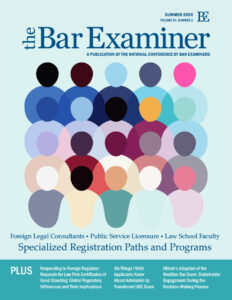A series of articles on topics of immediate significance to the bar admissions community.DIVERSITY SERIES: Diversity in the legal profession and efforts to enhance the participation and success of underrepresented and/or historically disadvantaged groups in legal education and bar admissions.This article originally appeared in The Bar Examiner print edition, Summer/Fall 2021 (Vol. 90, Nos. 2–3), pp. 31–33.

By Hon. Solomon Oliver, Jr. As a new member of NCBE’s Board of Trustees, I write to express my appreciation for the work of NCBE over the last 90 years and to express my thanks for being selected to serve on the board of this organization, which plays such a critical role in the legal profession. I am drawn to its mission of promoting fairness, integrity, and best practices in admission to the legal profession. I embrace its vision for a competent, ethical, and diverse legal profession. I also embrace its commitment, as stated on its Diversity, Fairness, and Inclusion web page, “to work toward greater equity … as a testing organization” and to “actively work to eliminate any aspects of [its] exams that could contribute to performance disparities among different groups.”1
As a new member of NCBE’s Board of Trustees, I write to express my appreciation for the work of NCBE over the last 90 years and to express my thanks for being selected to serve on the board of this organization, which plays such a critical role in the legal profession. I am drawn to its mission of promoting fairness, integrity, and best practices in admission to the legal profession. I embrace its vision for a competent, ethical, and diverse legal profession. I also embrace its commitment, as stated on its Diversity, Fairness, and Inclusion web page, “to work toward greater equity … as a testing organization” and to “actively work to eliminate any aspects of [its] exams that could contribute to performance disparities among different groups.”1
As I was growing up in Bessemer, Alabama, in the fifties and sixties, I did not imagine I might become a lawyer or a judge, and probably no one else did either. There were only a few Black lawyers in Alabama and not that many in the United States as a whole.2 I did not know or meet any. It almost goes without saying that few, if any, could have imagined that I might one day have the opportunity to join the board of the organization dedicated to creating and coordinating the licensing exam for our profession.
In the South where I grew up just outside of Birmingham, not only were things segregated from top to bottom, but there were those who were totally dedicated to keeping it that way, seemingly at any cost. This was the South of Bull Connor, the Birmingham sheriff who released dogs and firehoses on peaceful protesters, including children. This was the South of Governor George Wallace, who stood in the door of Foster Auditorium at the University of Alabama in an attempt to prevent two Black students from enrolling there. This was the same governor who had previously declared, “Segregation now, segregation tomorrow, segregation forever.” This was the South of the Ku Klux Klan, three of whose members bombed the Sixteenth Street Baptist Church one Sunday morning, killing four young Black girls who were worshipping there.
In that South, not only were things segregated, but they were grossly unequal. I have often said that there was no job or position that I, as an African American, could have that a White person wanted. Indeed, there was no law school for Blacks in the state of Alabama. However, despite the segregation, virulent racism, and inequality we faced, my brothers and sisters and I had parents who taught us that no race had a monopoly on talent and that we were all capable of doing great things despite societal constraints. Despite having no exposure to lawyers, I did have some sense of the importance of lawyers in our society based on the unfulfilled dreams of one of my uncles, who would have become a lawyer if the times had been right.
With the unfolding of the sixties’ civil rights movement, of which I was a substantial beneficiary, I gradually came to understand the critical role that lawyers played in that movement and, earlier, in the vindication of civil rights.3 In time, I came to appreciate more fully just how important lawyers are generally to the effective functioning of our society. I also became critically aware of the dearth of African Americans and other minorities in the profession.
So, during my almost 50 years at the bar, I have been continuously involved, both professionally and as a volunteer, in efforts to ensure both lawyer competence and opportunities for minorities in the profession. I have engaged in aspects of that work as a law professor and associate dean. For the past 20 years, I have served as a member of NCBE’s Evidence Drafting Committee for the Multistate Bar Examination (MBE), where I have thoroughly enjoyed interacting with some of the most accomplished legal scholars, lawyers, and judges in the field. I have also had the privilege of serving for more than 20 years in various capacities with the Section of Legal Education and Admissions to the Bar of the ABA, including as chair of the Council of that Section and as Section Delegate to the ABA House of Delegates. During that time, I have had the opportunity to share ideas and collaborate with sibling organizations, including NCBE.
As I conclude my work with the Evidence Drafting Committee and with the Section of Legal Education, I believe that becoming a member of the NCBE Board of Trustees provides me a very special opportunity to continue work in the areas of lawyer competence and ensuring opportunities for minorities. I am especially interested in the comprehensive work that NCBE has done, and continues to do, on the next generation of the bar exam and the final shape it will take over the next few years. I, of course, have a special interest in issues related to ensuring that bar exams, which serve as the gateway to the profession, do not have a disparate impact on minorities. I am also looking forward to supporting NCBE’s efforts to enhance opportunities for minorities in the profession, such as providing financial support to the Council on Legal Education Opportunity Inc. (CLEO) to establish the NCBE/CLEO Bar Passage Program, with the goal of helping minority and low-income law students prepare to pass the bar exam.4
It is true that we have made tremendous progress from my childhood days in Alabama toward increasing the presence of minorities in the profession. But we are reminded that we have a long way to go by the fact that, though African Americans constitute about 13 percent of the population, we make up only about 5 percent of lawyers.5
When I took the MBE in 1973, during its infancy, as part of the Ohio Bar Examination, it would have been hard for me to imagine that I would one day be on the board of the organization that produced it. It would also have been hard for me to imagine, though perhaps not hard for others, that there would one day be a Uniform Bar Examination that would be adopted by 40 jurisdictions to date. The growing acceptance of this exam provides an excellent opportunity for NCBE to provide the national leadership needed for jurisdictions to make appropriate assessments about the competence of those who should be admitted into the profession as lawyers. I am pleased to join the NCBE Board and look forward to doing whatever I can to advance its important work.
Notes
- National Conference of Bar Examiners; Diversity, Fairness, and Inclusion; https://www.ncbex.org/about/diversity-fairness-and-inclusion/. (Go back)
- Alabama had only 4 Black lawyers in 1930, and reportedly fewer than 25 in 1960. See Paul Finkelman, “Not Only the Judges’ Robes Were Black: African-American Lawyers as Social Engineers,” 47(1) Stan. L. Rev. 161, 209 n.144 (1994); History of the Magic City Bar Association, Magic City Bar Association, https://magiccitybarassociation.org/history (last visited Aug. 9, 2021). (Go back)
- I had the opportunity to serve as a law clerk for America’s first African American Article III judge, William H. Hastie, former Chief Judge of the US Third Circuit Court of Appeals. In “Toward an Equalitarian Legal Order, 1930–1950,” Judge Hastie describes the racist legal order existing as of 1930 and the national legal campaign led by the NAACP, in which he was involved, that was mounted against it. (William H. Hastie, “Toward an Equalitarian Legal Order, 1930–1950,” 407(1) Annals of the American Academy of Political and Social Science 18–31.) That campaign laid the groundwork for the US Supreme Court’s historic decision in Brown v. Board of Education in 1954. However, for most of the period I was growing up, including into the sixties, it was as if Brown had not been decided. (Go back)
- Former NCBE Board of Trustees member Judge Phyllis Thompson has clearly and compellingly stated the case for why diversity in the profession should be a matter of concern to the bar admissions community. See Hon. Phyllis D. Thompson, “Why Diversity Must Matter to the Bar Admissions Community,” 89(1) The Bar Examiner (Fall 2020) 65–67. (Go back)
- Similarly, other minorities also suffer significant underrepresentation. American Bar Association, Profile of the Legal Profession 2021, at 13 (2021). (Go back)

Hon. Solomon Oliver, Jr., is a Senior United States District Judge, and former Chief Judge, of the United States District Court for the Northern District of Ohio. He joined NCBE’s Board of Trustees in August 2021.
Contact us to request a pdf file of the original article as it appeared in the print edition.







